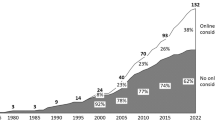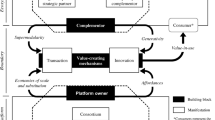Abstract
We describe a first experiment on whether product complexity affects competition and consumers in retail markets. We are unable to detect a significant effect of product complexity on prices, except insofar as the demand elasticity for complex products is higher. However, there is qualified evidence that complex products have the potential to induce consumers to buy more than they would otherwise. In this sense, consumer exploitability in quantities cannot be ruled out. We also find evidence for shaping effects: consumers’ preferences are shaped by past experience with prices, and firms may in principle exploit this to sell more.
Similar content being viewed by others
References
Ariely D., Loewenstein G., Prelec D. (2003) ‘Coherent arbitrariness’: Stable demand curves without stable preferences. Quarterly Journal of Economics 118: 73–105
Ariely D., Loewenstein G., Prelec D. (2006) Tom Sawyer and the construction of value. Journal of Economic Behavior and Organization 60: 1–10
Baltagi B. D., Song S. H., Jung B. C., Koh W. (2007) Testing for serial correlation, spatial autocorrelation and random effects using panel data. Journal of Econometrics 140: 5–51
Bostrom, J. (2005, March 16). Too many choices may slow consumer electronics spending. http://www.pcworld.com.
Camerer C. (1995) Individual choice. In: Kagel J. H., Roth A. E. (eds) Handbook of experimental economics. Princeton University Press, Princeton, pp 587–703
Dacko D. G. (2008) The Advanced dictionary of marketing. Oxford University Press, Oxford
Davies D. D., Holt C. A. (1993) Experimental economics. Princeton University Press, Princeton
Ellison, G, & Ellison, S. F. (2004). Search, obfuscation, and price elasticities on the internet. Discussion Paper, MIT and NBER.
Garrod L., Hviid M., Loomes G., Waddams Price C. (2008) Assessing the effectiveness of potential remedies in consumer markets. Office of Fair Trading, London
Huck S., Weiszacker G. (1999) Risk, complexity and deviations from EV maximisation—results of a lottery choice experiment. Journal of Economic Psychology 20: 699–715
Hughes, J. (2007, December 4). Investors puzzled by complex products. FT.com; 1.
Kerven, A. (2001, August 8). Study: Product variety confusing consumers. Cedmagazine.com.
Loomes G., Starmer C., Sugden R. (2003) Do anomalies disappear in repeated markets?. Economic Journal 113: C153–166
Mador G., Sonsino D., Benzion U. (2000) On complexity and lotteries evaluation—three experimental observations. Journal of Economic Psychology 21: 625–637
Rouse, A. (2008, May 21). Modern cars confusing consumers says study. http://www.articlealley.com/article_544293_19.html.
Sarin R. K., Weber M. (1993) Effects of ambiguity in market experiments. Management Science 39: 602–615
Sashegyi A. I., Brown S. K., Farrell P. J. (2000) Application of a generalized random effects regression model for cluster-correlated longitudinal data to a school-based smoking prevention trial. American Journal of Epistemology 152: 1192–1200
Sonsino D., Benzion U., Mador G. (2002) The complexity effects on choice with uncertainty: Experimental evidence. Economic Journal 112: 936–965
Sonsino D., Mandelbaum M. (2001) On preference for flexibility and complexity aversion: Experimental evidence. Theory and Decision 51: 197–216
Spiegler R. (2006) Competition over agents with boundedly rational expectations. Theoretical Economics 1: 207–231
Triano, N. (2001). Table radio showdown: Kloss Model One, CSW Model 88, & Bose Wave. http://www.geek.com/hwswrev/conel/tabrads/index.htm.
Wilson, C. M., & Waddams Price, C. (2006). Do consumers switch to the best supplier. University of East Anglia and ESRC Centre for Competition Policy Discussion Paper.
Zizzo, D. J. (2008). Experimenter demand effects in economic experiments. Social Science Research Network Discussion Paper.
Author information
Authors and Affiliations
Corresponding author
Additional information
The experimental instructions can be found as an online appendix at: http://www.uea.ac.uk/~ec601/PrCInstrApp.pdf.
Electronic Supplementary Material
The Below is the Electronic Supplementary Material.
Rights and permissions
About this article
Cite this article
Sitzia, S., Zizzo, D.J. Does product complexity matter for competition in experimental retail markets?. Theory Decis 70, 65–82 (2011). https://doi.org/10.1007/s11238-009-9163-1
Received:
Accepted:
Published:
Issue Date:
DOI: https://doi.org/10.1007/s11238-009-9163-1




